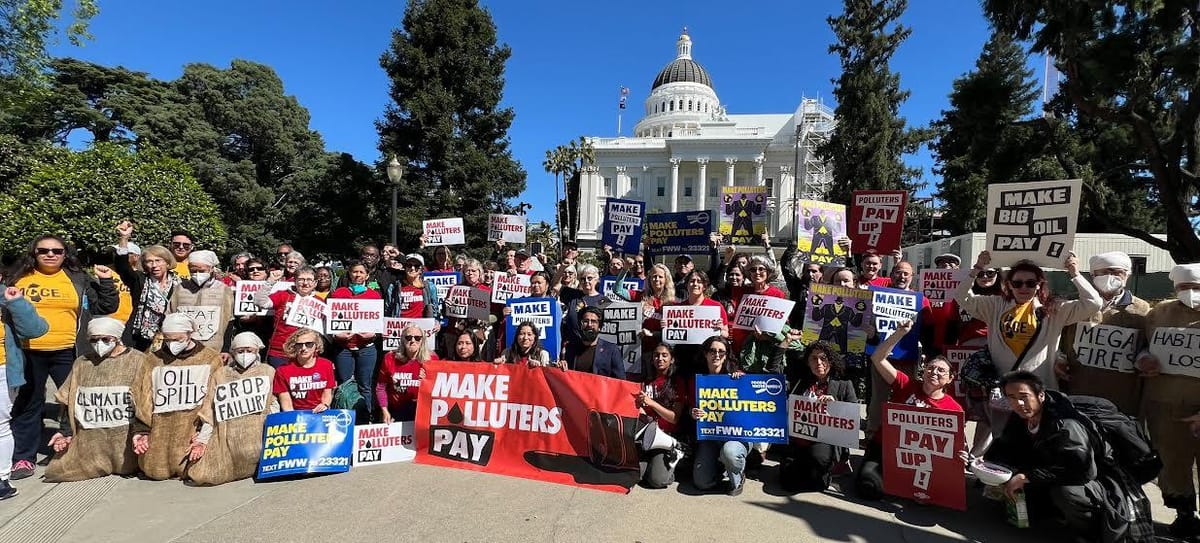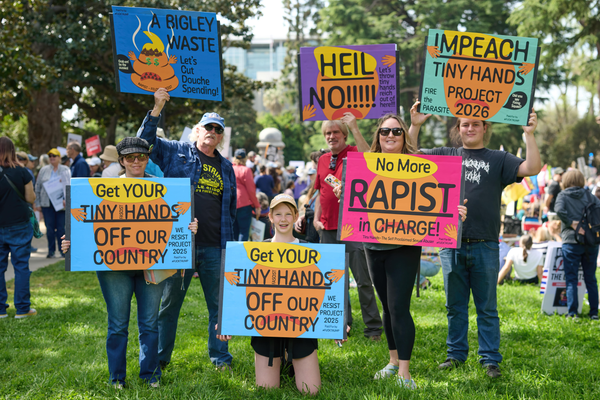Polluters Pay Climate Superfund Act Passes First California Senate Committee
California taxpayers are facing an “unprecedented and escalating financial burden” from recent wildfires and atmospheric river storms, creating an affordability crisis.

Sacramento — On March 2, the California Senate version of the Polluters Pay Climate Superfund Act passed out of the Senate Environmental Quality Committee in a 5-3 vote.
SB 684 is a bill that would require fossil fuel corporations to pay for the climate devastation they have contributed to across California. Similar bills have already been passed in 2024 by New York and Vermont.
The next confirmed Senate Committee hearing for SB 684 will be on April 29 in the Senate Judiciary Committee. The Assembly version of the bill, AB 1243, will be heard in Assembly Committees soon, with the dates to be announced.
Members of grassroots groups throughout the state overflowed the hearing room in support of the legislation. Bill advocates also rallied outside the building of the Western State Petroleum Association (WSPA), the largest and most powerful corporate lobbying group in Sacramento, to demand that polluters, not everyday Californians, pay for the billions of dollars in climate damages fossil fuels contribute to in the state.
“The number of Californians who came out to support this bill should signal to lawmakers that there is a large – and growing – desire to hold polluters accountable for their role in driving the climate crisis,” said Food & Water Watch California Director Nicole Ghio in a statement. “For too long, polluters have profited from their rampant pollution while Californians have been left footing the bill."
“And we cannot rely on support from the federal government when disaster strikes, as the Musk-Trump administration continues to loot and privatize public resources and politicize relief. California needs the revenue from this legislation to prepare for and recover after the next climate change induced disaster. We applaud the Polluters Pay Climate Superfund Act sponsors and supporters for moving this vital bill forward,” she concluded.
Senator Caroline Menjivar (D- San Fernando Valley) and Assemblymember Dawn Addis (D- Morro Bay) introduced SB 684 and AB 1243 on Feb. 21, 2025.
The Polluters Pay Climate Superfund Act will:
- “Direct CalEPA to complete a climate cost study to quantify total damages to the state (through 2045), caused by past fossil fuel emissions.
- Direct CalEPA to identify responsible parties and assess compensatory fees on the largest fossil fuel polluters proportional to their fossil fuel emissions 1990 through 2024, to address damages quantified in the cost study.
- Fund California’s future. Fees collected will fund projects and programs to mitigate disaster related rate increases for Californians and remedy or prevent climate-related costs and harms. The bill prioritizes labor and job standards and dedicates at least 40% of the funds to benefit disadvantaged communities.”
You can tell your legislators to pass the Polluters Pay Climate Superfund Act here:
https://actionnetwork.org/petitions/californians-make-polluters-pay
Oil lobby spends record money to attack climate legislation
Bill advocates are gearing up for a big fight to pass the legislation, considering the millions of dollars that Big Oil spends every year to attack climate bills and other environmental legislation.
In a post on X yesterday, the Western States Petroleum Association, the oil industry's trade organization, wrote: “#SB684 strongly opposed by labor, local chambers of commerce and #CAWorkers. Bill threatens jobs, affordability and future investment in California economy. #affordability #gasprices #costdriver #jobkiller”
“SB684 would increase costs on California consumers and businesses,” WSPA also claimed on X.
The oil industry spent a total of $38 million in lobbying expenses in 2024, shattering by 31 percent the annual state lobbying record of $26.2 million set in 2017, according to an analysis by the Last Chance Alliance (LCA).
Spending by two groups alone, Western States Petroleum Association (WSPA), the largest and most powerful corporate lobbying group in California, and Chevron, shattered the previous record, coming in at $31.6 million in 2024.
WSPA and Chevron accounted for 83% of the industry’s expenditure. The Western States Petroleum Association spent $17.4 million, while Chevron spent $14.2 million.
CRC/Aera Energy took third place in the Big Oil lobbying spending spree, spending $2.1 million in 2024. Marathon Petroleum placed fourth, spending $1.5 million, while Phillips 66 placed fifth, spending $876,563.
Big Oil crushed its two-year legislative session record as well, spending $65.8 million during the 2023-2024 legislative session. This far exceeds the $44.1 million spent during the 2017-2018 session, the LCA said.
Background on Polluters Pay Climate Superfund Act
The devastating January firestorm in Los Angeles County damaged or destroyed over 7,800 structures in the Palisades Fire, almost 10,500 structures in the Eaton Fire, and claimed the lives of 29 Californians.
In the wake of yet another climate catastrophe, Senator Caroline Menjivar (D- San Fernando Valley) and Assemblymember Dawn Addis (D- Morro Bay) introduced SB 684 and AB 1243 - The Polluters Pay Climate Superfund Act of 2025.
“At the core of these disasters are the Californians whose lives and property have been destroyed. Many of whom were already experiencing financial uncertainty due to the rising costs of basic needs; food, housing, utilities, and transportation to work,” said Senator Menjivar upon introducing the bill. “We must be relentless and creative in pursuing all avenues to redirect the financial burden away from the consumer as we mitigate the consequences of human-made disasters.”
“Profits for polluters skyrocket year over year, and California’s taxpayers simultaneously pinch their pennies for household expenses while also solely footing the bill for catastrophic wildfires and other related disasters. The Polluters Pay Climate Superfund Act is a commonsense way to tap into a small fraction of polluters’ profits, and collect their share of the financial burden,” Menjivar stated.
“The Central Coast has faced the devastating impacts of climate change, from floods and wildfires to coastal erosion,” said Assemblymember Dawn Addis. “This year’s fires in Los Angeles serve as a stark reminder that collective inaction has catastrophic consequences for all Californians.”
“’m proud to partner with my colleague, Senator Menjivar, and a diverse coalition of advocates to establish a climate superfund that will provide critical relief to impacted communities. We can’t deny that climate change is real, and we must take action now to prepare and rebuild after these devastating events,” Addis concluded.
Menivar noted that California taxpayers are facing an “unprecedented and escalating financial burden” from recent wildfires and atmospheric river storms, creating an affordability crisis. The recent devastation in Los Angeles alone is estimated to cost Californians at least $250 billion.
“The Polluters Pay Climate Superfund Act addresses the financial injustices imposed on taxpayers and working families from climate related disasters by requiring fossil fuel polluters to offset the costs pushed down on the taxpayer for the damage caused and enhanced by their products,” added Menjivar.



